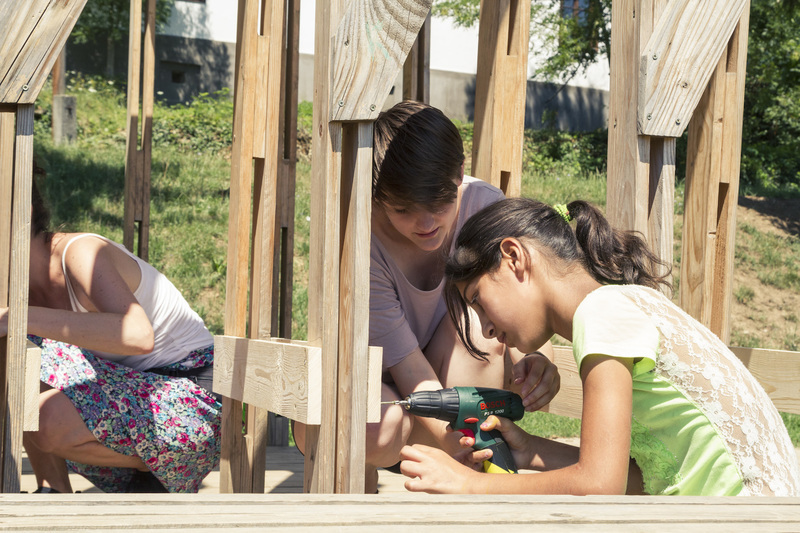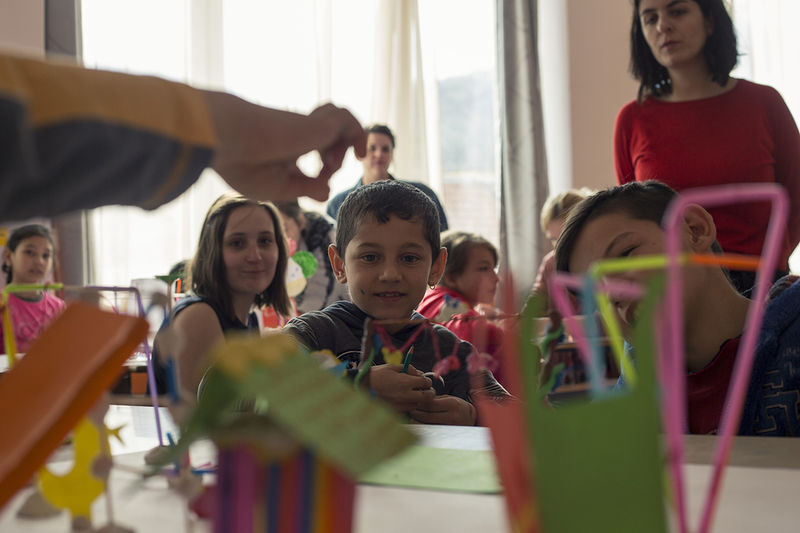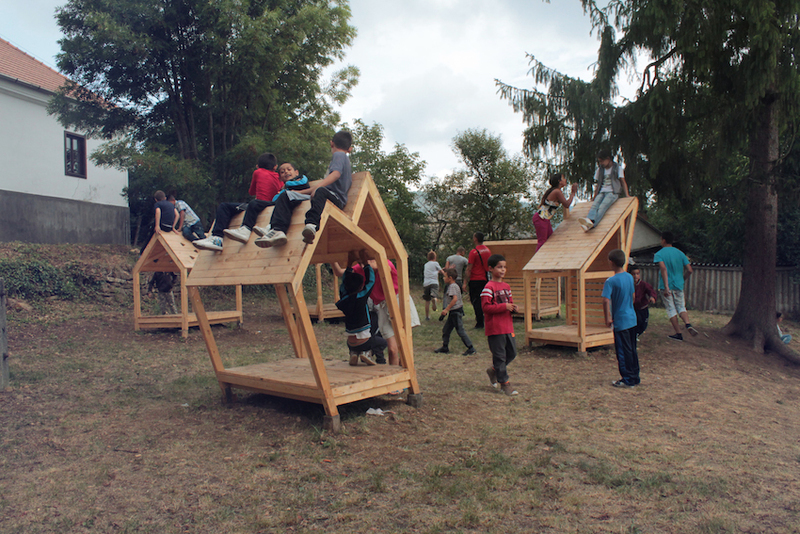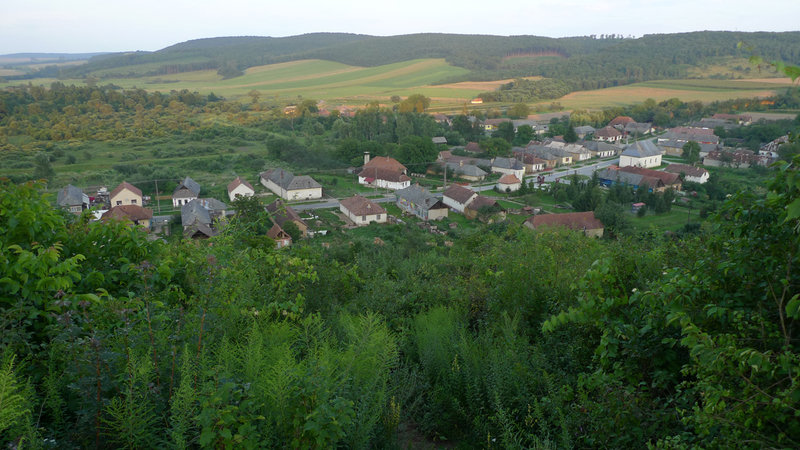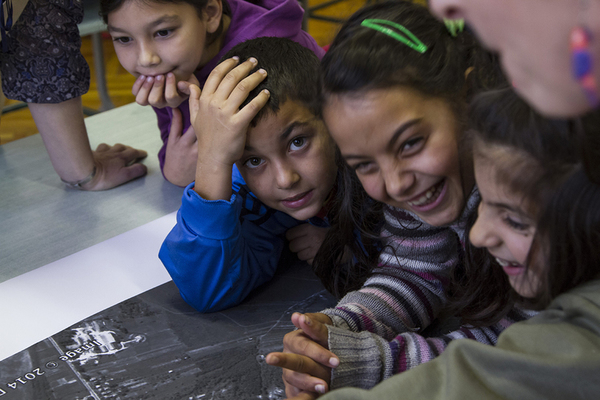Difference between revisions of "Long-Term Engagement: The Cloudfactory"
Rümeysa Önal (talk | contribs) |
|||
| (43 intermediate revisions by 5 users not shown) | |||
| Line 1: | Line 1: | ||
| − | Author: | + | {{Article |
| + | |Image=CF_SU_2015_bodvasz_ReniPetra_Nikolett Kustos.jpg | ||
| + | |Caption=Building The Cloudfactory together. Photo by Nikolett Kustos. | ||
| + | |Summary=Moholy-Nagy University of Art and Design Budapest (MOME) and the WdKA intent to learn from each other in connecting social arts and design education with practice. MOME recognised that to build a university for the 21st century means breaking down the walls of the elitist ivory tower and reaching out towards real problems and communities. Based on the experiences of Cloudfactory project, a continuous physical presence in the center of social challenges is essential in social design education. Cloudfactory Field Lab, a research center in remote Bodvaszilas that MOME plans to build in the next years, might be a much smaller scale development than the one in the Budapest campus. However in terms of impact on social design education in Hungary, it will be equal or perhaps even bigger. | ||
| + | |Article=Author: Bori Fehér and Daniel Barcza | ||
| − | == Social Design in the | + | == Bauhaus == |
| − | + | Social design education at Moholy-Nagy University of Art and Design Budapest (MOME) is not a new phenomenon. The social spirit and ideologies of the Hungarian born Laszló Moholy-Nagy and Marcel Breuer, two members of the Bauhaus movement have played a major role in the last hundred years' history of the university. As Moholy-Nagy put it: "Designing is not a profession but an attitude. Designing is a complex and intricate task. It is the integration of technological, social and economic requirements, biological necessities, and the psychophysical effects of materials, shape, color, volume, and space: thinking in relationships." [1]. However in the last two decades, an ever-stronger attention on social issues can be observed at the school. That might be a consequence of the post socialist political, economic and social transition, a result of the collapse of industrial sector in the nineties, the growth of unemployment and the change of socialist welfare system in the last 20 years. Hungary's social challenges slightly differ from the Western-European ones. Given the history and the Central-Eastern-European location, many of the rural parts of Hungary have serious poverty, unemployment and social exclusion issues, just to mention some, as of certain developing countries. | |
| − | + | == MOME EcoLab == | |
| − | + | It is not surprising, that the number of social related courses, projects, diploma works and doctoral researches are rising year by year. But despite of the high popularity of social issues among MOME students, the university is not running bachelor or master social design programs. Instead it introduced the so-called 'horizontal labs', interdisciplinary, project based, thematic research groups which invite students from all programs and levels of the university. MOME EcoLab, one of the three horizontal labs, had been created in 2010 with the aim to research sustainable design. In the first years environmental sustainability was the core focus of the lab, but after a while social sustainability gradually became more and more important. Today MOME EcoLab is the strongest curator of MOME social design education and research activity, it runs BA and MA courses, manages short and long-term design research projects, builds local and international collaborations and functions as a knowledge centre. | |
| − | + | [[File:CF_2015_SU_bodvasz_ 3_Nikolett Kustos.jpg|Photo by Nikolett Kustos]] | |
| − | In 2014 MOME has started to build a new campus within the framework of a national development plan. By 2018 a new technology center, new innovation, research center and new academic buildings will be constructed. Parallel to the infrastructure development the education and research programs will be restructured around strategic topics, focusing on the challenges of our times and society. Social design and innovation will be one of these strategic issues of the new portfolio. As Laszlo Moholy-Nagy told: | + | == The immediate and the ultimate == |
| + | In 2014 MOME has started to build a new campus within the framework of a national development plan. By 2018 a new technology center, new innovation, research center and new academic buildings will be constructed. Parallel to the infrastructure development the education and research programs will be restructured around strategic topics, focusing on the challenges of our times and society. Social design and innovation will be one of these strategic issues of the new portfolio. As Laszlo Moholy-Nagy told: "The designer must see the periphery as well as the core, the immediate and the ultimate" [2], Following the spirit of him, we believe, social design education cannot be realized without understanding the context, being on the site, without interacting with the local communities, without taking long-term commitment in empowering people. That is why MOME decided to extend its Cloudfactory project and build a Field Lab in a remote part of rural Hungary, in the Bódva valley, where social challenges are not statistical numbers but a real, tangible situation. | ||
| − | + | == Changing context – being there == | |
| − | One of the most important educational aspects of the project is to help students to get out of their comfort zone by changing physical, social and cultural context. | + | One of the most important educational aspects of the project is to help students to get out of their comfort zone by changing physical, social and cultural context. Design students are traditionally trained to create top quality products, services and cultural assets for the most effluent segment of our society. Haute-couture fashion, futuristic car concepts, fine-dining tableware, just to mention some domains of our students' comfort zones. For them, arriving to Bódva valley and confronting with another reality is striking: decaying adobe houses with no windows and running water; hungry kids; and other tangible signs of poverty; social exclusion, unemployment and lack of opportunities. The challenges that local Roma communities are facing on a daily basis are completely different from what those MOME students are traditionally trained for. Experiencing and understanding the context is the first step to understand these challenges. Throughout the semesters, MOME students are taken to the valley for shorter or longer periods to collaborate with the local community. These are not 'site visits' but real opportunities to 'be there', to connect physically and mentally with the different context and the community. 'Being there' also helps to keep students focused and motivated. However, reality of the unknown might also bring anxiety and push unprepared students towards the panic zone, confronting with reality can create stress among them. That is why Cloudfactory introduced a thorough psychological briefing and specific trainings for students to prepare them what they might face, debriefing sessions after workshops and regular supervisions in order to help students to cope with stress and avoid accumulating it. |
| − | |||
| − | |||
| − | |||
| − | |||
| − | + | == Long term Interaction == | |
| − | + | When students stepped out of their comfort zone, the next foundational point of the Cloudfactory model is the long-term, ongoing interaction between the local community and the participating MOME students that MOME EcoLab has developed throughout the 4 years of their presence at Bódva Valley. On the one hand this interaction takes place in the living relationships and friendships that emerged with the community, through a process where for example an architect student teaches a 9 year old girl how to drive screws and the girl teaches the the young designer about songs she's proud of to know about. On the other hand these interactions appear in the co-developed and co-designed structures and interventions that emerged on the courtyard of the elementary school in the last few years. These installations; a roof that is used for various outside activities, a colorful bench, a village of little wooden houses that acts as learn and playscape are there when we can't. They are all designed carefully and intentionally with an open end, thus work as a sign of assurance for long-term development and commitment. | |
| − | + | Photo by Nikolett Kustos | |
| − | + | == Empowerment and responsibility == | |
| + | There is an ongoing debate in the field of development studies and social sciences about the definition and nature of empowerment. However, it is the best term to describe what Cloudfactory project aims to achieve with local kids and young designers. According Julian Rappaport empowerment means: "to enhance the possibilities for people to control their life"[3]. It aims to provide autonomy and self-determination. It is hard to measure the impact of empowerment among local kids of the Bodva Valley, both because the relatively short history of the project and because the lack of impact-measuring system that needs to be developed. The nature of empowerment among university students, are much better described. Within the European higher education area, learning outcomes are defined by a set of guidelines and standards by the European Qualification Framework (EQF) . It differentiates three categories of descriptors: knowledge, skills and competences. The last one, competence, means a proven ability to use knowledge and skills in certain situations and is further divided into autonomy and responsibility. While bachelor programs tend to provide students with specific knowledge and skill set, master level education focuses on developing competences, strengthening professional autonomy, building up self-determined and responsible attitude, according to EQF. These last ones are exactly the key points of empowerment. However, these competencies are hard to be taught in a classroom environment. That's why Cloudfactory program puts students in real life context, where they must interact with locals, other disciplines, confront with problems, use their existing knowledge and skills or develop new ones. Most MOME students who visited the Cloudfactory have become much more aware, responsible and dedicated to social challenges and to social design. It's already strongly tangible but still, impact-measurement needs to be developed. By 2018 the new MOME campus will be completed with a state-of-the-art technology park, a brand new innovation center and new BA and MA schools. Parallel to this, leaders of MOME EcoLab are working on a new interdisciplinary social design MA program and thematic doctorate research programs that are planned to be fundamental part of MOME's future education and research portfolio. | ||
| + | '''MOME EcoLab''' is the Sustainability Research Group of the Moholy-Nagy University of Art and Design Budapest. The Lab was founded in 2010 by Daniel Barcza and Bori Feher. It is a practice-based, open, creative think-and-do-tank. Its aim is to develop creative, sustainable, and tangible solutions for the social and ecological challenges of the 21st century, to create positive value where it is most needed and so achieve big impacts with small interventions | ||
| − | + | '''Daniel Barcza''' is the vice rector of Moholy-Nagy University of Art and Design Budapest (MOME). He teaches sustainable design, social design and ecology on Master courses and at the Doctoral School. | |
| − | + | ||
| + | '''Bori Feher''' is an architect and social designer. She is a doctorate student at MOME where she researches the possibilities of resilience and adaptation in social innovation design. Bori also works as a research fellow at MOME, where she manages the university's international research and development programs. | ||
| + | |||
| + | |||
| + | [[File:2015-09-04 11.30.41 masolat.jpg|Photo by Nikolett Kustos]] | ||
| + | |||
| + | [[File:_Peter_Pettendi_Szabo_Bodva Valley.jpg|Photo by Peter Pettendi-Szabo]] | ||
| + | |||
| + | |||
| + | |||
| + | '''MOME EcoLab''' is the Sustainability Research Group of the Moholy-Nagy University of Art and Design Budapest. The Lab was founded in 2010 by Daniel Barcza and Bori Feher. It is a practice-based, open, creative think-and-do-tank. Its aim is to develop creative, sustainable, and tangible solutions for the social and ecological challenges of the 21st century, to create positive value where it is most needed and so achieve big impacts with small interventions | ||
| + | |||
| + | '''Daniel Barcza''' is the vice rector of Moholy-Nagy University of Art and Design Budapest (MOME). He teaches sustainable design, social design and ecology on Master courses and at the Doctoral School. | ||
| + | |||
| + | '''Bori Feher''' is an architect and social designer. She is a doctorate student at MOME where she researches the possibilities of resilience and adaptation in social innovation design. Bori also works as a research fellow at MOME, where she manages the university's international research and development programs. | ||
| + | }} | ||
| + | {{Article Selection Overview | ||
| + | |Article=How to make it work | ||
| + | }} | ||
| + | {{Category selector | ||
| + | |Category=Education | ||
| + | }} | ||
| + | {{Category selector | ||
| + | |Category=Empowerment | ||
| + | }} | ||
| + | {{Category selector | ||
| + | |Category=Participation | ||
| + | }} | ||
| + | {{Category selector | ||
| + | |Category=Spatial Design | ||
| + | }} | ||
| + | {{Category selector | ||
| + | |Category=Strategies | ||
| + | }} | ||
| + | {{Articles more}} | ||
Latest revision as of 14:43, 29 October 2018
Author: Bori Fehér and Daniel Barcza
Bauhaus
Social design education at Moholy-Nagy University of Art and Design Budapest (MOME) is not a new phenomenon. The social spirit and ideologies of the Hungarian born Laszló Moholy-Nagy and Marcel Breuer, two members of the Bauhaus movement have played a major role in the last hundred years' history of the university. As Moholy-Nagy put it: "Designing is not a profession but an attitude. Designing is a complex and intricate task. It is the integration of technological, social and economic requirements, biological necessities, and the psychophysical effects of materials, shape, color, volume, and space: thinking in relationships." [1]. However in the last two decades, an ever-stronger attention on social issues can be observed at the school. That might be a consequence of the post socialist political, economic and social transition, a result of the collapse of industrial sector in the nineties, the growth of unemployment and the change of socialist welfare system in the last 20 years. Hungary's social challenges slightly differ from the Western-European ones. Given the history and the Central-Eastern-European location, many of the rural parts of Hungary have serious poverty, unemployment and social exclusion issues, just to mention some, as of certain developing countries.
MOME EcoLab
It is not surprising, that the number of social related courses, projects, diploma works and doctoral researches are rising year by year. But despite of the high popularity of social issues among MOME students, the university is not running bachelor or master social design programs. Instead it introduced the so-called 'horizontal labs', interdisciplinary, project based, thematic research groups which invite students from all programs and levels of the university. MOME EcoLab, one of the three horizontal labs, had been created in 2010 with the aim to research sustainable design. In the first years environmental sustainability was the core focus of the lab, but after a while social sustainability gradually became more and more important. Today MOME EcoLab is the strongest curator of MOME social design education and research activity, it runs BA and MA courses, manages short and long-term design research projects, builds local and international collaborations and functions as a knowledge centre.
The immediate and the ultimate
In 2014 MOME has started to build a new campus within the framework of a national development plan. By 2018 a new technology center, new innovation, research center and new academic buildings will be constructed. Parallel to the infrastructure development the education and research programs will be restructured around strategic topics, focusing on the challenges of our times and society. Social design and innovation will be one of these strategic issues of the new portfolio. As Laszlo Moholy-Nagy told: "The designer must see the periphery as well as the core, the immediate and the ultimate" [2], Following the spirit of him, we believe, social design education cannot be realized without understanding the context, being on the site, without interacting with the local communities, without taking long-term commitment in empowering people. That is why MOME decided to extend its Cloudfactory project and build a Field Lab in a remote part of rural Hungary, in the Bódva valley, where social challenges are not statistical numbers but a real, tangible situation.
Changing context – being there
One of the most important educational aspects of the project is to help students to get out of their comfort zone by changing physical, social and cultural context. Design students are traditionally trained to create top quality products, services and cultural assets for the most effluent segment of our society. Haute-couture fashion, futuristic car concepts, fine-dining tableware, just to mention some domains of our students' comfort zones. For them, arriving to Bódva valley and confronting with another reality is striking: decaying adobe houses with no windows and running water; hungry kids; and other tangible signs of poverty; social exclusion, unemployment and lack of opportunities. The challenges that local Roma communities are facing on a daily basis are completely different from what those MOME students are traditionally trained for. Experiencing and understanding the context is the first step to understand these challenges. Throughout the semesters, MOME students are taken to the valley for shorter or longer periods to collaborate with the local community. These are not 'site visits' but real opportunities to 'be there', to connect physically and mentally with the different context and the community. 'Being there' also helps to keep students focused and motivated. However, reality of the unknown might also bring anxiety and push unprepared students towards the panic zone, confronting with reality can create stress among them. That is why Cloudfactory introduced a thorough psychological briefing and specific trainings for students to prepare them what they might face, debriefing sessions after workshops and regular supervisions in order to help students to cope with stress and avoid accumulating it.
Long term Interaction
When students stepped out of their comfort zone, the next foundational point of the Cloudfactory model is the long-term, ongoing interaction between the local community and the participating MOME students that MOME EcoLab has developed throughout the 4 years of their presence at Bódva Valley. On the one hand this interaction takes place in the living relationships and friendships that emerged with the community, through a process where for example an architect student teaches a 9 year old girl how to drive screws and the girl teaches the the young designer about songs she's proud of to know about. On the other hand these interactions appear in the co-developed and co-designed structures and interventions that emerged on the courtyard of the elementary school in the last few years. These installations; a roof that is used for various outside activities, a colorful bench, a village of little wooden houses that acts as learn and playscape are there when we can't. They are all designed carefully and intentionally with an open end, thus work as a sign of assurance for long-term development and commitment. Photo by Nikolett Kustos
Empowerment and responsibility
There is an ongoing debate in the field of development studies and social sciences about the definition and nature of empowerment. However, it is the best term to describe what Cloudfactory project aims to achieve with local kids and young designers. According Julian Rappaport empowerment means: "to enhance the possibilities for people to control their life"[3]. It aims to provide autonomy and self-determination. It is hard to measure the impact of empowerment among local kids of the Bodva Valley, both because the relatively short history of the project and because the lack of impact-measuring system that needs to be developed. The nature of empowerment among university students, are much better described. Within the European higher education area, learning outcomes are defined by a set of guidelines and standards by the European Qualification Framework (EQF) . It differentiates three categories of descriptors: knowledge, skills and competences. The last one, competence, means a proven ability to use knowledge and skills in certain situations and is further divided into autonomy and responsibility. While bachelor programs tend to provide students with specific knowledge and skill set, master level education focuses on developing competences, strengthening professional autonomy, building up self-determined and responsible attitude, according to EQF. These last ones are exactly the key points of empowerment. However, these competencies are hard to be taught in a classroom environment. That's why Cloudfactory program puts students in real life context, where they must interact with locals, other disciplines, confront with problems, use their existing knowledge and skills or develop new ones. Most MOME students who visited the Cloudfactory have become much more aware, responsible and dedicated to social challenges and to social design. It's already strongly tangible but still, impact-measurement needs to be developed. By 2018 the new MOME campus will be completed with a state-of-the-art technology park, a brand new innovation center and new BA and MA schools. Parallel to this, leaders of MOME EcoLab are working on a new interdisciplinary social design MA program and thematic doctorate research programs that are planned to be fundamental part of MOME's future education and research portfolio.
MOME EcoLab is the Sustainability Research Group of the Moholy-Nagy University of Art and Design Budapest. The Lab was founded in 2010 by Daniel Barcza and Bori Feher. It is a practice-based, open, creative think-and-do-tank. Its aim is to develop creative, sustainable, and tangible solutions for the social and ecological challenges of the 21st century, to create positive value where it is most needed and so achieve big impacts with small interventions
Daniel Barcza is the vice rector of Moholy-Nagy University of Art and Design Budapest (MOME). He teaches sustainable design, social design and ecology on Master courses and at the Doctoral School.
Bori Feher is an architect and social designer. She is a doctorate student at MOME where she researches the possibilities of resilience and adaptation in social innovation design. Bori also works as a research fellow at MOME, where she manages the university's international research and development programs.
MOME EcoLab is the Sustainability Research Group of the Moholy-Nagy University of Art and Design Budapest. The Lab was founded in 2010 by Daniel Barcza and Bori Feher. It is a practice-based, open, creative think-and-do-tank. Its aim is to develop creative, sustainable, and tangible solutions for the social and ecological challenges of the 21st century, to create positive value where it is most needed and so achieve big impacts with small interventions
Daniel Barcza is the vice rector of Moholy-Nagy University of Art and Design Budapest (MOME). He teaches sustainable design, social design and ecology on Master courses and at the Doctoral School.
Bori Feher is an architect and social designer. She is a doctorate student at MOME where she researches the possibilities of resilience and adaptation in social innovation design. Bori also works as a research fellow at MOME, where she manages the university's international research and development programs.Links
CONTRIBUTE
Feel free to contribute to Beyond Social.
